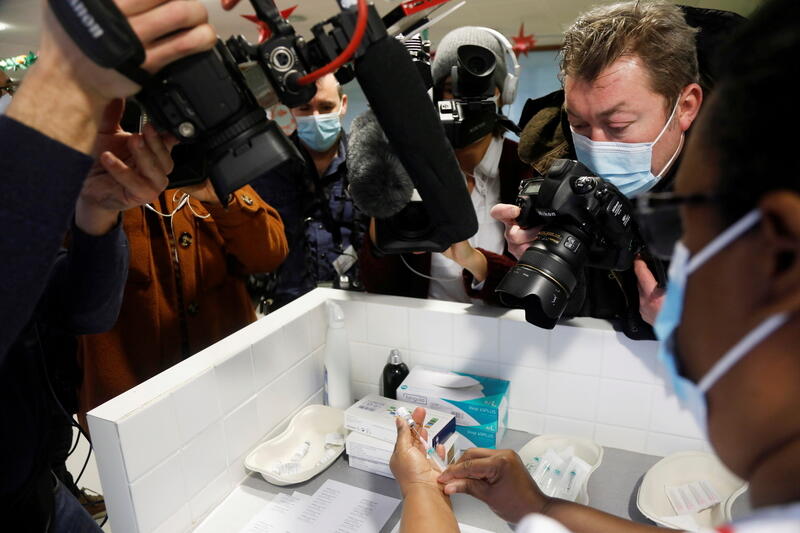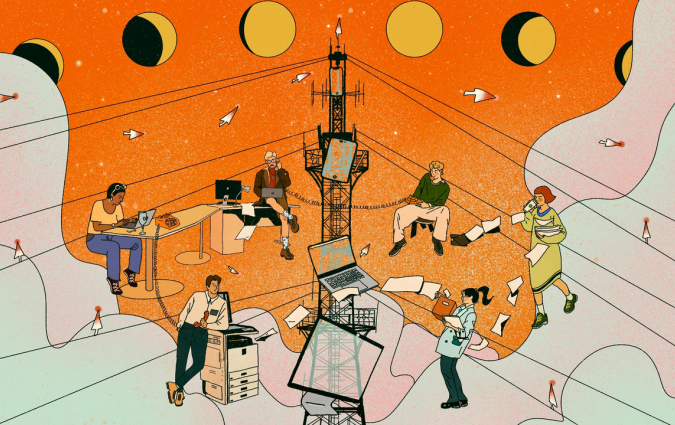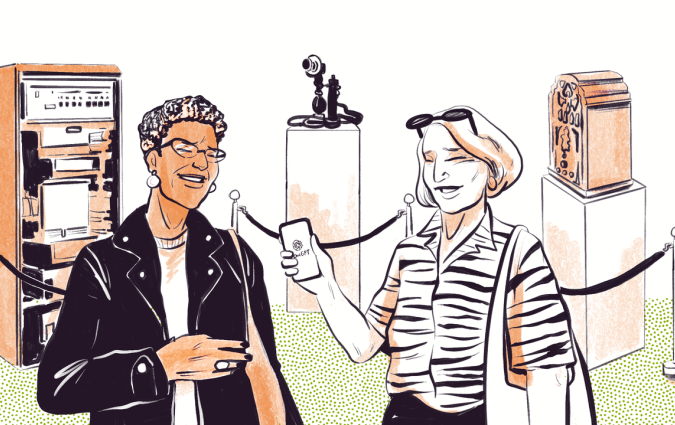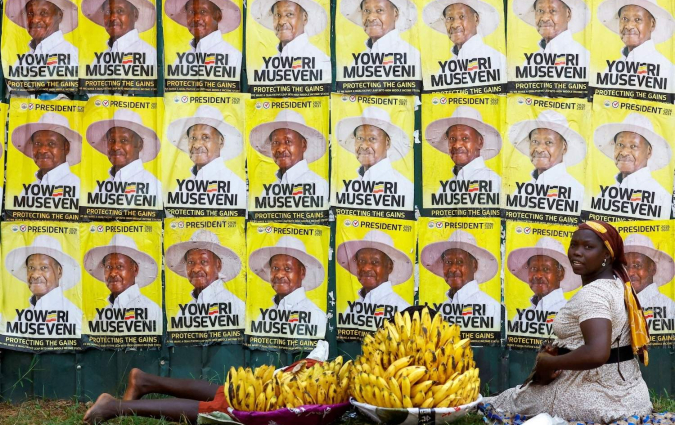Our podcast: What should we expect for journalism in 2021?

A nurse prepares a dose of the Pfizer-BioNTech COVID-19 vaccine, surrounded by media staff, Bobigny, France, December 30, 2020. REUTERS/Charles Platiau
The topic
In this episode of our Future of Journalism podcast we look at our annual survey of 234 digital leaders in 43 countries to look at the major trends that will influence journalism in the year ahead. We look at how news organisations are adapting in the face of the pandemic and how they expect to come out of it. We ask what revenue streams will become most important over the next 12 months, and how news organisations will navigate their relationships with social media platforms. We also look at changes in leadership and innovation.
The speakers
Host: Federica Cherubini, Head of Leadership Development at the Reuters Institute.
Guest: Nic Newman, Senior Research Associate at the Reuters Institute and lead author of the report Journalism, Media and Technology Trends and Predictions 2021.
The podcast
On Spotify | On Apple | On Google
The transcript
On optimism in the news industry ↑
Nic: I was expecting to find, given everything that’s going on, a huge amount of gloom and doom, but actually I think 73% said they were optimistic about their own company’s prospects and pretty much half said they were optimistic about journalism in general, which actually is higher than this time last year. And I think to some extent that reflects the fact that although the pandemic has been extremely difficult economically, very distressing personally, it’s also taken away some of those barriers to change that have sort of been frustrating people on the one hand. And then I think secondly it reflects a sort of confidence that somehow in the pandemic people were coming back to journalism, that the product itself was really valuable to people. And people hope that maybe we’ve turned a corner where we can again sort of distinguish journalism from the mass of information that’s out there on the internet.
On COVID-19's impact on newsrooms ↑
Nic: What was really good about the survey is we had people talking about the different ways in which they expected their business to be different or journalism to be different in 2021. And I think a couple of things. One is obviously working practices. So, we saw for the first time the whole television output being done from people’s homes using Zoom for autocue and this would have been unheard of a year ago. We also saw newspapers being outputted with literally nobody in the office. So, the whole thing was remote. Journalists who’d been sort of holding out against many of these technology trends were forced to work in a different way and embrace these new tools. And I think talking to people this year they say we’re not going back to how things were. The newsrooms of the future are going to be different; they’re going to be hybrid, they’re going to be in person and remote, together. And this year is really going to be about working out how that happens. And that’s partly about the tools but it’s also about trying to find the balance between the efficiency of remote working which people like by the way. They say they don’t want to go back to the office. But also, how do you get the creativity? How do you avoid the sort of lack of human contact which people find very difficult? So, that’s the first thing.
And then I think the second sort of theme is really around journalism itself. Again, during the crisis, we saw that there was a sort of renewed focus on facts because that’s what people wanted. The value of specialist journalists really came out, whether you were a health journalist or whether you were answering listeners' questions. That was a huge theme. And I think specialism is going to be more valued, answering listeners' questions, these formats are going to be used more and valued more. And then I think we’re going to see more coverage of certain areas like mental health obviously, it’s going to be a huge theme. More reporters covering those kind of subjects. Wellness. And also trying to find more positivity in journalism as well. So, these are all the themes that people talked about.
On COVID-19's impact on business models↑
Nic: When we ask people, what would be the most important business model for their company in 2021, subscription is now at the top. So, where we’ve asked this question before, it’s been advertising, it’s now subscription. And so, we’re going to all have more paywalls, more barriers to content for some of us, for example. We’re going to get quite irritated by that I think this year. But I think the other message is really revenue diversification. So, there’s no silver bullet, it’s not subscriptions or advertising, it’s kind of both of those. And then on top of that, on average our respondents said that four different revenue streams were going to be important to them this year. And that included things like events, which there’s a huge interest in, e-commerce and also direct payment from platforms is going to be much more significant this year because both Google and Facebook are planning to roll out more walled gardens where they pay content directly, they license content directly. And that’s going to be a really interesting story to watch in 2021.
On e-commerce ↑
Nic: That’s a really good question. So, I think that - and I mean in some ways this goes back to the fact that during the pandemic we’ve all got much more used to buying things online. And so therefore the sort of chain of how you get interested in a product in the first place and then go on to complete it, becomes much more critical. So, in the UK for example it was 20% at the beginning, e-commerce’s percentage of the total retail was 20%, it’s now 35%. So, a massive increase in our familiarity with that. And publishers are thinking, well how can we get involved with that? And so, I think there’s kind of two things. One, is you’ve got publishers trying to create recommendations if you like, independent recommendations. The Independent in the UK does that with its best buy section. You have the New York Times, that’s a separate site called Wirecutter, where it’s basically recommending in an impartial way, different products and making affiliate fees from that.
But then you also have the opportunity to brand things directly. So, Buzzfeed’s been doing this for some time with Tasty ice cream for example, based on its Tasty brand. And they are planning this year to focus on wellness and sex aimed at millennials and so they’re selling things like sex toys and working with the manufacturers to actually sell physical goods online as well. So, you can call that journalism, or you can call it information. But these are ways in which publishers are thinking maybe we can get a share of that growing market.
On events ↑
Nic: What we’ve seen is this enormous change where suddenly the whole - millions of people have got confident and comfortable with going online and for paying for things and consuming things over video. So, previously events were very much about physical networking, relatively small numbers of people, high value. Increasingly you can create an event [where] you can invite hundreds of thousands of people to it or millions in the case of Jean-Michel Jarre who did his new concert, you can stream it, you can create a whole load of interactive content around it. Quite how that’s going to work out in monetisation terms I’m not sure, but publishers are definitely looking at events and thinking about what is their physical events strategy? What’s their online events strategy? Whether that’s just to create email addresses. Maybe how do we combine that and make it hybrid? So, I think there’s going to be a lot of action in that space.
On COVID misinformation benefiting trusted news ↑
Nic: Publishers feel that the rise of false news, misinformation, has strengthened their position or will strengthen their position. Something like 68% felt it would. And I think a lot of that goes back to that sense that during this crisis they had obviously record audiences, the explanatory fact-based approach has really worked, answering questions. I mean one person - one of the senior editors talked about a renaissance of the news. And I think for loyalists, that’s probably true. But if you look more widely we also see there’s a significant number of people who increased their usage of social media during this period, or alternative media sources. So, we know there’s a lot of people who are turning away from mainstream media, despite record audiences and believe in something different. For example, with COVID-19 around the vaccines. And we’ve seen that in the US. We’ve also seen it in the UK where large numbers of people protesting outside hospitals saying that the hospitals are empty, it’s all a fake and these are not people who are part of that renaissance of journalism if you like. And I think there’s a real worry and that media companies are really thinking as well about how to create that extra loyalty with their existing loyalists. How do you reach those people who are developing these alternative sets? How do you find ways of getting reliable information to them? Whether you’re a public service broadcaster or a subscription newspaper, there’s a lot of thought going on there but it’s going to be a theme this year.
On innovation ↑
Nic: I think the innovation question has been fascinating and again partly because of what happened in the pandemic. Because we saw a lot of innovation very, very quickly. I mean in things like journalistic formats for example, pop-up newsletters, pop-up podcasts, often created literally in a couple of days. There was one the other day, I don’t know if you saw it Federica, but ProPublica scraping all the videos from Parler for example and creating this sort of fantastic navigable, interactive timeline that you could go through all the different videos by time and place. And this kind of innovation happens because when there’s a huge news event, bureaucracy is just stripped away. There’s no time. And so, teams feel empowered to make that change and do something they’ve never done before. And I think in the case of that example around Parler, it’s also different types of people working together. So, that idea of the multidisciplinary teams, a designer, somebody who understands the data structure of Parler, a journalist. You need all those people to be working in that cross-functional way. So, I think that media companies have long recognised this is the best way to do innovation and it’s not a sort of hierarchical, top down thing. But they haven’t quite worked out how to do it and so they’re still trying to impose those hierarchical models and sort of the silos and the politics continues to get in the way. I actually think this is one of the biggest problems facing media companies and maybe, maybe the pandemic will have made people think again about how to remove that bureaucracy and how to get the sort of horizontals, if you like, working better.
On product managers ↑
Nic: In the survey we asked people how important they thought [the product manager role] was and 93% said this was an incredibly important role. It’s kind of the translator if you like. It’s one of the key roles that gets those different disciplines working together. But it also really shapes in an evidence based way, what you should do and what you shouldn’t do. So, it’s not just looking at gut feel. But we found that only half or so, or less than half actually, felt that the role was understood, the people on the journalistic side for example, understood what product managers do and why it’s important. So, there’s definitely a gap there and I think it just speaks to what I was talking about earlier, is that sort of publishers know the right things to do and the right roles to have, but it hasn’t quite jelled yet. So, maybe 2021 will be the year it does.
On talent ↑
Nic: I think the Substack story has been fascinating. But we should remember that we’ve seen this before with blogs where that possibility that an individual journalist is going to be able to separate themselves from a news organisation and build that direct relationship and make significant amounts of money. Now the difference is that was based on advertising and we know how that worked out. Substack and some of the other models, like the Forbes model is either fully or partly based on subscription and the economics of that are very different. If you have 1,000 people subscribing to your newsletter at say $5.99, that’s $60,000, $70,000 a year and if you get 2,000 people that’s double that and you’re getting into lots of money for top end providers who can attract 3,000, 4,000 people. And why would you not do that and share that with another company? I think the Forbes model is interesting, it’s kind of a halfway house where you still get some of the benefits of being part of a company, so it’s an editorial independence, help with sort of editing, legal if things come up, so you’re not completely on your own. But of course, they want to take some of the money. So, yeah these models I think are going to be interesting. I don’t think they’re going to replace traditional media organisations but it’s an extra layer of journalism and of connection and of making money for journalists as well, which is definitely worth watching this year.
On AI ↑
Nic: Publishers feel that AI is the one they really need to get their heads around. We’ve been talking about it for a number of years, but mainly in a lab situation rather than real life. And what we now have, and I think this year we’re going to see much more of, is practical, real life applications of this. For example, on the news gathering side you have a publication in Peru that’s created a tool that uses machine learning to essentially spot potential patterns of corruption in government procurement contracts. So, that’s kind of a really good example on the news gathering side. On the production side you have big news agencies like Reuters and others using speech-to-text technologies, that’s another part of the AI set, trying to make its historic videos much more searchable. So, you can go directly to the point in a long video that you need, much quicker to get what you need. And then you’ve got a whole load of publications using AI tools to monitor things like gender and racial bias in the output and then flag the results to editors. So, these are things that you could do manually, you could write it all down, but technology makes it possible to scale those things across different platforms. And then there’s a whole load of stuff around personalisation as well, which is I think a huge challenge about how to do that right and how to mix technology like AI and journalistic common sense as well.
On smart devices and 5G ↑
Nic: We’ve been in a period I guess of smartphone dominance and the question now is, what lies beyond the smartphone? And I think that partly because of 5G we’re moving to more devices that are going to be independently connected to the internet. So, some will have screens, some won’t have screens and some of these are really growing very fast now. So, headphones which used to be just sort of attached to your smartphone are becoming independent platforms in their own right. Smart speakers, these are controlled - will be controlled increasingly by voice or gesture. So, these are growing very fast. You also have smart watches which is the fastest growing sector of all, after a very slow start. And then this year we’re certainly going to see some more activity around smart glasses. So, the idea that you can have a digital overlay as you look out on the world. So, both Apple and Facebook are going to make announcements, or likely to make announcements of some kind this year. And I think the takeaway from all of that is that there are going to be more moments when we can slip information into our ears or into our eyelines going forward and therefore we need to think more about the context in which people are receptive to news at particular times and the formats they’re going to work in those environments as well.
Listen to our episodes on:
Alan Rusbridger and his new book | BBC's fight against disinformation | the rise of daily news podcasts | the public editor's role | the pandemic's impact on journalism | the most vulnerable to COVID-19 misinformation | this year's Digital News Report






